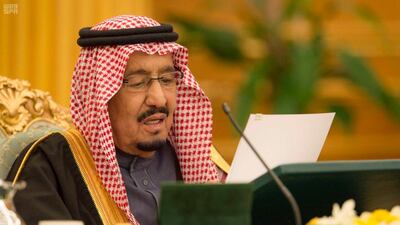After two years of belt-tightening and cutting expenses that stifled economic growth, Saudi Arabia is changing gears. The Arab world’s biggest economy has released a record expansionary budget with spending set to reach 978 billion riyals (Dh957bn) next year, a 5.4 per cent increase on the actual expenditure in 2017.
“Given the economic slowdown experienced in 2017, continued spending in 2018 is critical to stimulate the economy and improve Saudi’s attractiveness as an investment venue,” economists at National Commercial Bank, the country’s largest lender, said in its budget commentary on Wednesday.
The Saudi economy is projected to contract 0.5 per cent in 2017 but expand by 2.7 per cent in 2017, according to the kingdom’s ministry of finance. Although the country’s budget deficit next year is projected to decline to 7.3 per cent of the nation’s GDP from 8.9 per cent in 2017, Saudi Arabia will have to continue spending if it intends to achieve its economic growth targets in 2018.
“The announced spending was above our expectations but the uptrend in oil prices sets the scene for less austerity without threatening the path of gradual deficit reduction,” Maya Senussi, senior Economist for Middle East at Oxford Economics said.
Still, headwinds remain, she noted, adding that the government’s 2.7 per cent growth projections looks optimistic. “Ultimately what bears watching is the extent to which spending feeds through to non-oil investment.”
____________
Read more:
Saudi Arabia unveils biggest ever budget to propel growth
Saudi Arabia to launch tourist visas in early 2018
Saudi Arabia's budget deficit narrows to 8.9% for 2017
Saudi economy year in review: Credit Suisse bullish on Tadawul upgrade potential
____________
The headline figure is impressive, but what’s more important is where the kingdom plans to spend the money. Health and social development, “economic resources”, education, infrastructure, military and security and regional administration, clearly the priority areas for policy makers in Riyadh. Planned spending on these sectors account for about 77 percent of total budget allocations, Fahad Alturki, the chief economist and head of research at Jadwa Investments, said in a research note.
The government has allocated 105bn riyals - about 10.7 per cent of the total spending - to the development of economic resources, a 122 per cent jump from 2017, emphasising the importance placed on economic diversification away from hydrocarbon revenues.
Riyadh intends to spend 147bn riyals on the expansion and modernisation of health and social development infrastructure in the country. The amount is 22 per cent higher than 2017 allocations and account for the 15 per cent of the total. The 192bn allocations for education sector is 4.5 per cent lower year-on-year, however, it still accounts for close to 20 per cent of expenditure.
Budgeted spending of 54bn riyals on infrastructure is also 5.5 per higher than 2017 while planned expenditure on municipality services of 53bn riyals is 10.6 bigger than last year, according to the budget document.
Saudi Arabia’s budgeted capital spending, will amount to 205bn riyals in 2018, compared to 180bn riyals in 2017, which shows a “renewed emphasis by government to support growth in the private sector” according to Jadwa Investments.
Separately, a total of 133bn riyals will be expended by the Public Investment Fund (PIF) and the National Development Fund (NFD) in capital spending next year. This amount, according to finance ministry’s statement, will not be funded through the 2018 budget.
The PIF, Saudi Arabia’s sovereign wealth fund, will spend 83bn riyals whilst the NDF will spend 50bn riyals, on specific projects in Saudi Arabia, a move that can significantly boost the level of capital injections in the country.
Riyadh plans to spend 210bn riyals on military and 101bn riyals on Security are both 10 per cent 4.5 per cent higher respectively than the expenditures last year, a clear sign that the government has to spend more to protect its security within its border and continue fighting extremists beyond its geographical boundaries.

